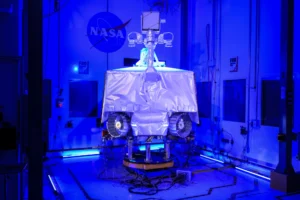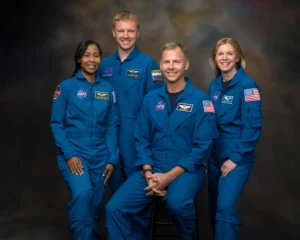What’s Happening in Space Policy July 21-27, 2024
Here is SpacePolicyOnline.com’s list of space policy events for the week of July 21-27, 2024 and any insight we can offer about them. The House and Senate are in session this week.
During the Week
It’s a busy week with important events on Capitol Hill and elsewhere.
Starting on the Hill, the House and Senate are back in session. They’ll be here next week, too, and then out until the second week of September. They hope to get a lot done before that, especially on appropriations.
The House Appropriations Committee has already completed work on all their bills and five have been considered on the floor, although the most recent one failed to pass. That’s the Legislative Branch bill that funds Congress itself. This week they are scheduled to take up Energy-Water, Interior, Financial Services, and Agriculture. The only one of those that has anything to do with space is Financial Services, which includes the FCC. The Commerce-Justice-Science (CJS) bill that funds NASA and NOAA and the Transportation-HUD (THUD) bill that funds the FAA and its Office of Commercial Space Transportation could come up next week.

The Senate Appropriations Committee is at the beginning of its process. They cleared three bills on July 11 and three more will be considered this week (Thursday) including CJS and THUD. We’ll be eagerly keeping an eye out for when they release the bills and see what they have in mind for FY2025, especially for NASA.
NASA’s science budget is already under stress and the House bill would target science again. Last week NASA announced it is terminating the VIPER lunar rover program because of cost growth. The rover is fully assembled and ready for testing and they’ve already spent $450 million and anticipate saving just $84 million by cancelling it. But NASA is worried the costs might grow even more if the launch is delayed again because Astrobotic’s Griffin lunar lander isn’t ready or technical problems emerge during testing. It was supposed to launch in 2023, slipped to 2024, and now won’t be ready at least until September 2025.
The announcement was made last Thursday. This Tuesday, the 2024 NASA Exploration Science Forum (NESF 2024) begins in St. Louis and VIPER is one of the first topics on the agenda. Joel Kearns, who heads the part of the Science Mission Directorate (SMD) that oversees VIPER, is scheduled to speak Tuesday morning at 9:15 am Central Time (10:15 am Eastern) and VIPER project scientist Anthony Colaprete is on the agenda later in the day. On Thursday morning, NASA’s Lunar Exploration Analysis Group (LEAG) will hold a special Town Hall meeting on VIPER’s cancellation.

Those will certainly be the most attention-getting sessions at NESF2024, but there are LOTS more during the three-day conference including a public lecture Tuesday evening on “Origin of the Moon” by the Southwest Research Institute’s Robin Canup. In addition to being a renowned astrophysicist who specializes in the origins of planets and satellites, she co-chaired the most recent planetary science Decadal Survey by the National Academies of Sciences, Engineering, and Medicine.
Another really interesting science conference is taking place at Caltech in Pasadena, CA this week. The Tenth International Conference on Mars begins tomorrow (Monday) and runs through Thursday. NASA’s signature upcoming Mars mission, Mars Sample Return, is having its own troubles. NASA paused the program after an independent review revealed substantial cost growth. The agency is seeking innovative ideas on how to get the samples being collected by the Perseverance rover back to Earth in an affordable manner. A plenary session on Mars Sample Return is scheduled for Thursday morning Pacific Time.

NASA also is helping ESA with its reconfigured ExoMars program now that Russia is out of the picture and ESA’s Rosalind Franklin rover needs another way to get down to the surface. An ExoMars/Rosalind Franklin update is Thursday afternoon. Another especially interesting session that afternoon is “Forward Planning for the Exploration of Mars.” The Planetary Society’s Casey Dreier will spell out “Spending Trends for NASA’s Robotic Mars Program, 1962-2029” and other speakers will discuss “Commercial Services and Guiding Principles the Next Generation of Martian Exploration,” “Future Mars Mission Planning at the European Space Agency,” and “Exploring Mars Together: The Mars Exploration Future Plan.”
NASA is looking for savings in its astrophysics program, too. NASA’s FY2025 budget request showed that it plans to significantly cut funding for the 25-year-old Chandra X-ray telescope even though it is still producing excellent science. NASA astrophysics division director Mark Clampin will speak to NASA’s Astrophysics Advisory Committee on Tuesday morning and this undoubtedly will come up. Chandra astrophysicist Grant Tremblay posted on X two days ago that “huge and irreversible” layoffs will be announced internally on August 5 “and we’ll be gone by October.” Fellow Chandra astrophysicist Jonathan McDowell clarified that they’re only irreversible after September 30 and NASA still has time to change its mind.
To be clear: “irreversible” means “irreversible after Sep 30”. Until then, still time for NASA to change their mind. These cuts do not immediately shut Chandra down, but they leave a very limited mission that, while good science, is only a shadow of what the community has now. https://t.co/LJyuQBaAdl
— Jonathan McDowell (@planet4589) July 19, 2024
Some members of Congress want to protect Chandra, but NASA Administrator Bill Nelson points out that if Congress is going to cut NASA funding, something’s got to give.
NASA will hold two news conferences on Friday to preview the launch of Crew-9 to the International Space Station. They will launch on a SpaceX Crew Dragon spacecraft on a SpaceX Falcon 9 rocket. SpaceX suffered a rare Falcon 9 failure on July 12 and it’s not clear when the rocket will resume launches. NASA apparently is optimistic it’ll be soon and the Crew-9 exchange with Crew-8 will take place as scheduled in mid-August. The first news conference at noon ET is with NASA and Roscosmos officials. The second at 2:00 pm ET is with the crew.

NASA also said it’ll hold a media briefing this week with an update on the Boeing Starliner Crew Flight Test. When they launched on June 5, NASA astronauts Butch Wilmore and Suni Williams were only supposed to visit the ISS for eight days, but it’s now more than six weeks — and counting. Boeing and NASA are trying to figure out the cause of several thruster failures (all but one are back online now) and helium leaks and those tests can only be done while Starliner is in orbit. We’ll post the date and time of the briefing when NASA announces the details.

On the national security space front, there are three very interesting events.

On Wednesday, Lt. Gen. Sean Gainey, Commander of the Army Space and Missile Defense Command, will be at the Hudson Institute to discuss “what role Army forces should play in space operations” and other topics with Hudson Senior Fellow Timothy Walton. It’ll be livestreamed.
The Mitchell Institute has two events. Tomorrow morning, the Commander of U.S. Space Force’s Space Training and Readiness (STAR) Command, Maj. Gen. Timothy Sejba, will be interviewed for the Schriever Spacepower Series. STARCOM is one of the three Space Force field commands. Its job is to educate and train Guardians “to fight and win in a contested, degraded and operationally limited environment.”
Then on Thursday, the Institute will release a policy paper on “Small Satellites: Answering the Call for Space Superiority.” The paper’s author, Charles Galbreath, will discuss it with Space Systems Command’s Col. Byron McClain on Zoom.
Those and other events we know about as of Sunday morning are shown below. Check back throughout the week for others we learn about later and add to our Calendar — especially the promised NASA update on Starliner — or changes to these.
Monday, July 22
- Schriever Spacepower Series with Maj. Gen. Timothy Sejba, Commander, U.S. Space Force STAR Command (Mitchell Institute), virtual, 9:00 am ET
Monday-Thursday, July 22-25
- Tenth International Conference on Mars, California Institute of Technology, Pasadena, CA/virtual
- Planetary Science and Space Exploration, Daejeon, South Korea
Monday-Friday, July 22-26
- Farnborough International Airshow 2024, Farnborough, U.K.
Tuesday, July 23
- Lunar Launch and Landing Facilities Workshop (LSIC), virtual, 10:00 am – 5:00 pm ET
- Lockheed Martin 2Q2024 Financial Results telecon, virtual, 11:00 am ET
Tuesday-Wednesday, July 23-24
- NASA Astrophysics Advisory Committee, virtual, 9:00 am-5:00 pm ET each day
Tuesday-Thursday, July 23-25
- NASA Exploration Science Forum 2024 (NESF 2024), Washington University, St. Louis, MO/virtual
Wednesday, July 24
- Future of Army Space and Missile Defense Command with LTG Sean Gainey (Hudson Inst), 1201 Pennsylvania Ave., N.W., Washington, DC, 9:00-10:00 am ET (livestreamed)
Wednesday-Thursday, July 24-25
- 17th Australian Space Forum, Adelaide, Australia
Thursday, July 25
- Senate Appropriations Committee Markup of FY2025 CJS, THUD and State-Foreign Ops Bills, 106 Dirksen Senate Office Building, Washington, DC, 9:30 am ET (webcast)
- Policy Paper Release–Small Satellites: Answering the Call for Space Superiority (Mitchell Inst), virtual, 12:00 pm ET
- NOAA Listening Session on Commercial Remote Sensing Regulations, virtual, 2:00-4:00 pm ET
Friday, July 26
- Two NASA News Conferences on Upcoming Crew-9 Launch, JSC (watch on NASA TV)
- 12:00 pm ET: Mission Overview News Conference
- 2:00 pm ET: Crew News Conference
User Comments
SpacePolicyOnline.com has the right (but not the obligation) to monitor the comments and to remove any materials it deems inappropriate. We do not post comments that include links to other websites since we have no control over that content nor can we verify the security of such links.